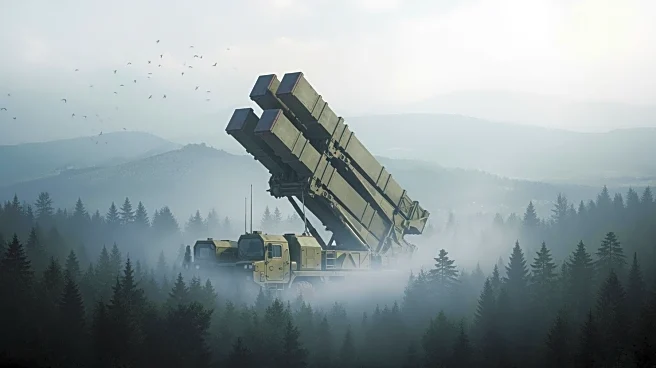What's Happening?
U.S. Ambassador to Turkey, Thomas Barrack, who also serves as an envoy to Lebanon and Syria, has raised concerns about Hezbollah's military capabilities during a conference in Manama, Bahrain. Barrack reported that Hezbollah maintains a force of approximately
40,000 militants and possesses between 15,000 and 20,000 rockets and missiles. He highlighted the disparity in earnings between Hezbollah fighters and Lebanese army soldiers, with the former earning significantly more, which complicates efforts to dismantle Hezbollah's military power. Barrack emphasized the ongoing threat posed by Hezbollah's arsenal to Israel, noting that Israel continues to conduct strikes in Lebanon due to the presence of these weapons. He urged Lebanese leadership to expedite disarmament efforts, warning that Israel might respond militarily depending on developments.
Why It's Important?
The situation underscores the persistent threat Hezbollah poses to regional stability, particularly to Israel. The group's substantial military capabilities, supported by Iran, present a significant challenge to Lebanon's sovereignty and stability. The disparity in pay between Hezbollah fighters and Lebanese soldiers highlights the socio-economic factors that bolster Hezbollah's influence. The U.S. envoy's remarks reflect the urgency of addressing Hezbollah's military presence to prevent further escalation in the region. The ongoing tension affects not only Lebanon and Israel but also has broader implications for Middle Eastern geopolitics, potentially involving other regional powers like Turkey.
What's Next?
The call for disarmament by the U.S. envoy suggests potential diplomatic efforts to address the issue, though the path forward remains complex. Lebanon's leadership faces the challenge of consolidating its military capabilities while managing internal socio-economic issues. The international community, including the U.S., may increase diplomatic pressure on Lebanon to take decisive action against Hezbollah. Meanwhile, Israel's military posture indicates readiness to respond to any perceived threats, which could lead to further military engagements if the situation remains unresolved.
Beyond the Headlines
The situation in Lebanon highlights the broader geopolitical dynamics in the Middle East, where non-state actors like Hezbollah wield significant power. The group's influence is not only military but also socio-economic, as it provides essential services in areas where the Lebanese state is absent. This dual role complicates efforts to disarm Hezbollah without addressing the underlying socio-economic issues. The involvement of regional powers like Turkey in mediating conflicts, as noted by Barrack, indicates a shifting landscape where traditional alliances and enmities are being reevaluated.

















